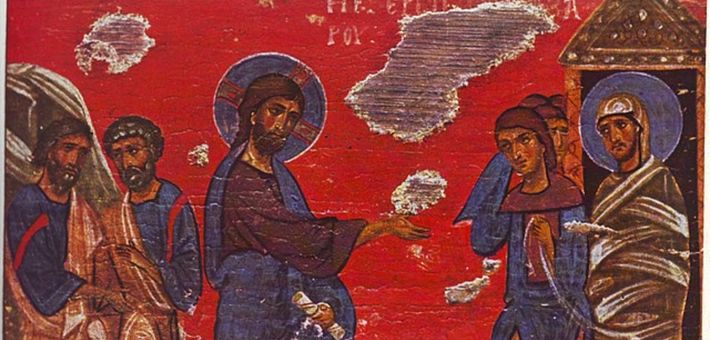Commentary on Romans 8:6-11
After a one-week break, the Fifth Sunday in Lent returns to the book of Romans. In Romans 8, we have been brought into the courtroom to await a verdict from the judge. But instead of hearing a word of judgment, we hear this declaration: “There is therefore now no condemnation for those who are in Christ Jesus” (8:1, English Standard Version). Yet, the lives of most people are filled with condemnation.
As the Bible makes clear, in our fractured world people are ready to condemn others for any perceived wrong (for example, Matthew 7:1-2; Romans 2:1); our own hearts can condemn us (1 John 3:20); and God’s first word to us, the Law, condemns us in our sins (for example, 2 Corinthians 3:9; Romans 3.9-20). But, miraculously, God’s second and final word, the Gospel, declares: because of Christ, no condemnation. As Paul explains in Romans 8, what the Law could not do—make us righteous—because of sin, God has done by sending Jesus into the world, so that “the righteous requirement of the law might be fulfilled in us, who walk not according to the flesh but according to the Spirit” (8:4).We are saved from condemnation by the Condemned One. But how, and in what way, does this freedom from condemnation take root in our lives now?
Flesh and spirit: two mindsets
In verses 6-8, Paul contrasts two mindsets or ways of thinking: one is set on the flesh, the other on the Spirit of God. The contrast is stark: one leads to death, the other to life and peace. The flesh, for Paul, is not merely our physical being, but is rather often depicted as a power that is hostile to God; when one lives life “in the flesh”—under its power—it is impossible to please God (Romans 8:8). This is life apart from God, a way of living and thinking that is directed toward and dominated by worldly concerns. As Paul makes clear in chapter 7, to be “of the flesh” means to be “sold under sin” (7:14); indeed, the flesh is not the site of even potential righteousness, for “I know that nothing good dwells in me, that is, in my flesh.” Even the “desire to do what is right” is frustrated by the inability “to carry it out” (7:18). Flesh, sin, and death are inextricably tied together for Paul: thus, God condemns “sin in the flesh.”
A mindset directed toward the flesh is our default orientation in this world in which sin and death reign (Romans 5:14, 21), and it is a way of life that does not, cannot, “submit to God’s law” (8:6) or “please God” (8:8). Accordingly, condemnation and death follow. But the hope that Paul preaches is that in the Gospel we have been freed from this mindset and so set free from the Law’s condemnation. A new mindset is possible—and promised—because of the giving of Jesus and the sending of the Spirit, a mindset that leads to life and peace. Not an imagined life and peace, but one that takes root in our present lives. As Paul will explain, the Gospel cultivates the mindset of the Spirit in us, to shape how we live and act.
The power and promise of the Spirit
If Paul contrasts two possible mindsets, he calls us to inhabit the mindset of the Spirit as people in whom God’s Spirit dwells. If the Spirit dwells in you, you belong to Christ. For Paul, God’s Spirit is not a future possibility but is here now, bringing the life of the future into the present with hope for the future. The new life in Christ brings peace now—“to set the mind on the Spirit is life and peace”—and resurrection hope. Although the “body is dead because of sin,” meaning the body is still mortal and will still receive death as “the wages of sin” (Romans 6:23), the Spirit of the risen Christ now dwells in you. If the Spirit of the resurrecting God lives in you, Paul says, you can have hope that he will give life to your “mortal bodies” through that same Spirit. Thus, if we live in a world filled with condemnation, in the Gospel God says: no condemnation. And if we live in bodies that are dead because of sin, in the Gospel God says: life. Because of the Spirit we belong to Christ, in whom we have life, righteousness, and hope.
In the Gospel, the Spirit invades our lives to unite us to Christ, in whom we are made righteous; to make our dead bodies the site of new life; and to give us hope for the future. Christians now have the possibility to live in a way that corresponds with the verdict of “no condemnation” that has been given to them, to set their minds on the Spirit instead of the flesh. Practically, we might ask: where and how do I need to remove myself from cycles of condemnation (for example, social media, news), change habits of speech, or how I relate to others? But most importantly, we take hope in the fact that the declarations of this passage belong to the work of God, the Father, Son, and Holy Spirit. Through Scripture, worship, and prayer, we turn our ears to Christ to be rooted in the Gospel rather than trusting every condemning word of the world, our own hearts, even of the Law. God’s Word is stronger; to every word spoken against us, God says, “No condemnation,” now or ever. God’s absolution in Christ is new every day, every hour, to deliver us from condemnation and to set us right in the life of the Spirit.


March 26, 2023